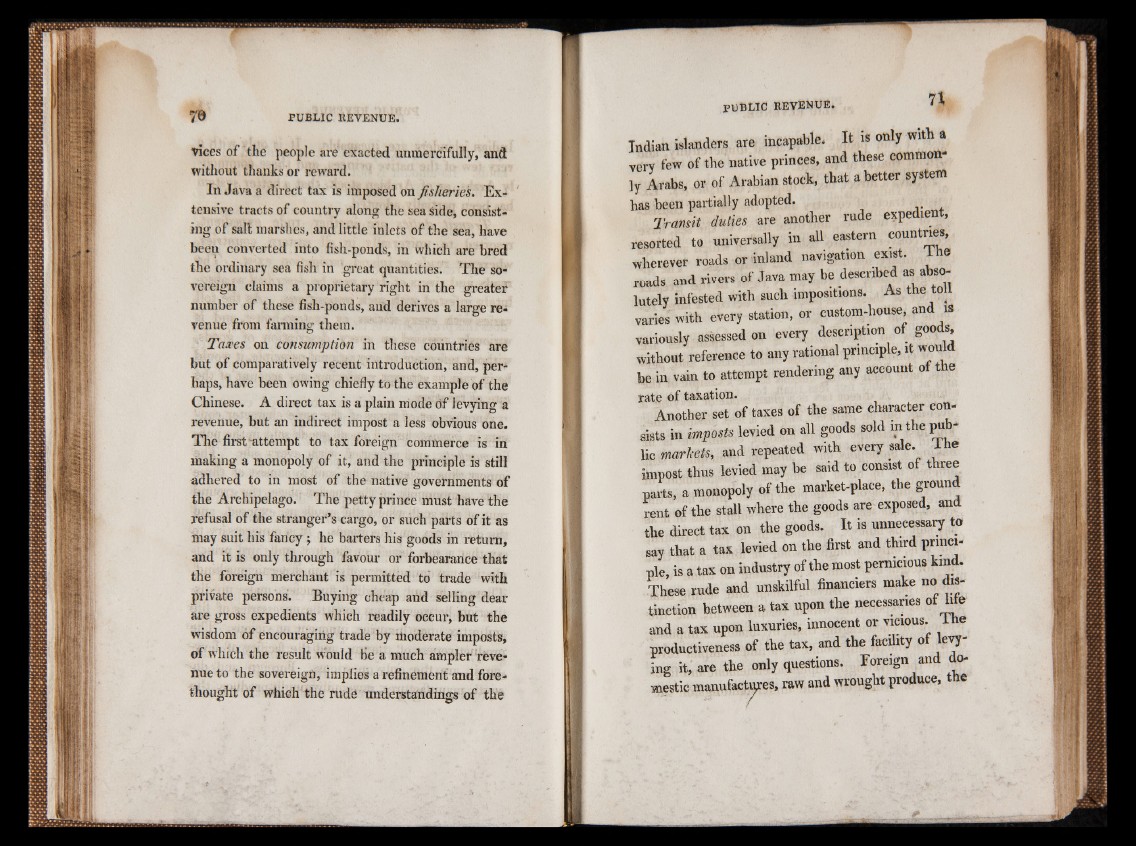
vices of the people are exacted unmercifully, and
without thanks or reward.
In Java a direct tax is imposed on fisheries. Extensive
tracts of country along the sea side, consisting
of salt marshes, and little inlets of the sea, have
been converted into fish-ponds, in which are bred
the ordinary sea fish in great quantities. The sovereign
claims a proprietary right in the greater
number of these fish-ponds, and derives a large revenue
from farming them.
Taxes on consumption in these countries are
but of comparatively recent introduction, and, perhaps,
have been owing chiefly to the example of the
Chinese. A direct tax is a plain mode df levying a
revenue, but an indirect impost a less obvious one.
The first'attempt to tax foreign commerce is in
making a monopoly of it, and the principle is still
adhered to in most of the native governments of
the Archipelago. The petty prince must have the
refusal of the stranger’s cargo, or such parts of it as
may suit his fancy ; he barters his goods in return,
and it is only through favour or forbearance that
the foreign merchant is permitted to trade with
private persons. Buying cheap and selling dear
are gross expedients which readily occur, but the
wisdom of encouraging trade by moderate imposts,
of which the result would be a much ampler revenue
to the sovereign, implies a refinement and forethought
df which the rude understandings of the
pu b l ic r e v e n u e .
Indian islanders are incapable. It is only Wlt^ *
very few of the native princes, and these commonly
Arabs, or of Arabian stock, that abetter system
has been partially adopted. Transit duties are another rude expedient,
resorted to universally in all eastern countries,
wherever roads or inland navigation exist. The
roads and rivers of Java may be described as absolutely
Infested with such impositions. As the toll
varies with every station, or custom-house, and is
variously assessed on every description of goods
without reference to any rational principle, it would
be in vain to attempt rendering any account of the
ratAe noof tthaexra tsioetn .of taxes of the same character consists
in imposts levied on all goods sold m the public
m a rk ets, and repeated with every sale. th e
impost thus levied may be said to consist of three
parts, a monopoly of the market-place, the ground
rent of the stall where the goods are exposed, and
the direct tax on the goods. It is unnecessary to
say that a tax levied on the first and third principle,
is a tax on industry of the most pernicious kind.
These rude and unskilful financiers make no distinction
between a tax upon the necessaries of life
and a tax upon luxuries, innocent or vicious, lhe
productiveness of the tax, and the facility
ing it, are the only questions. Foreign and domestic
manufactures, raw and wrought produce, the